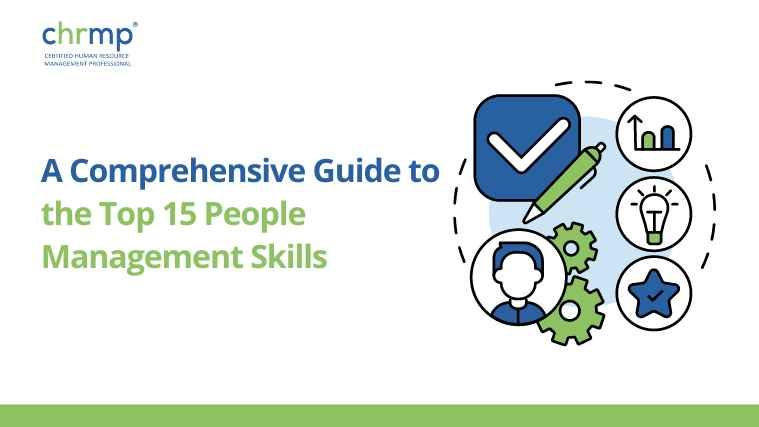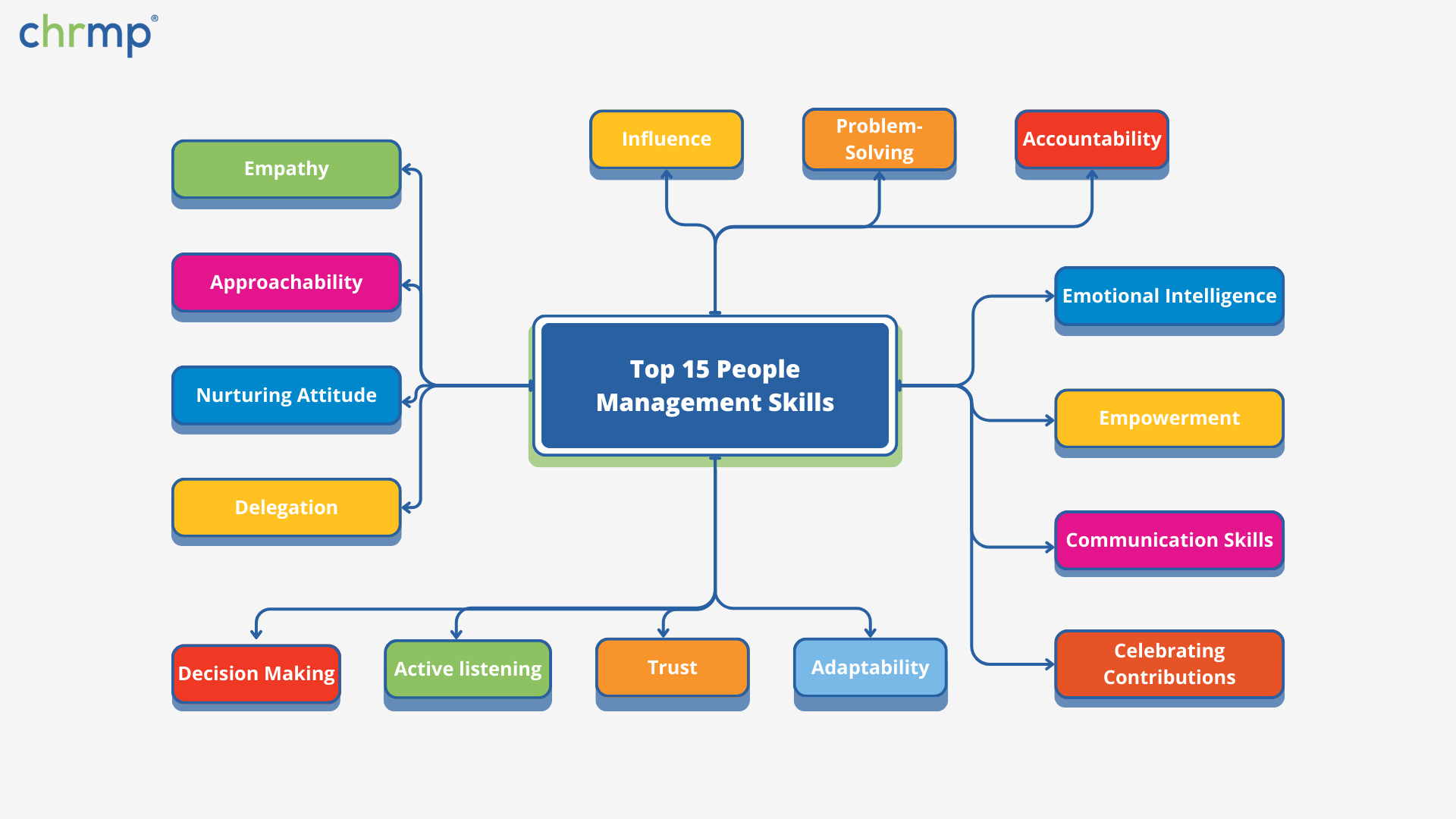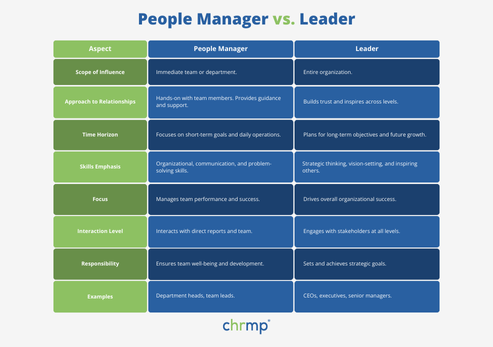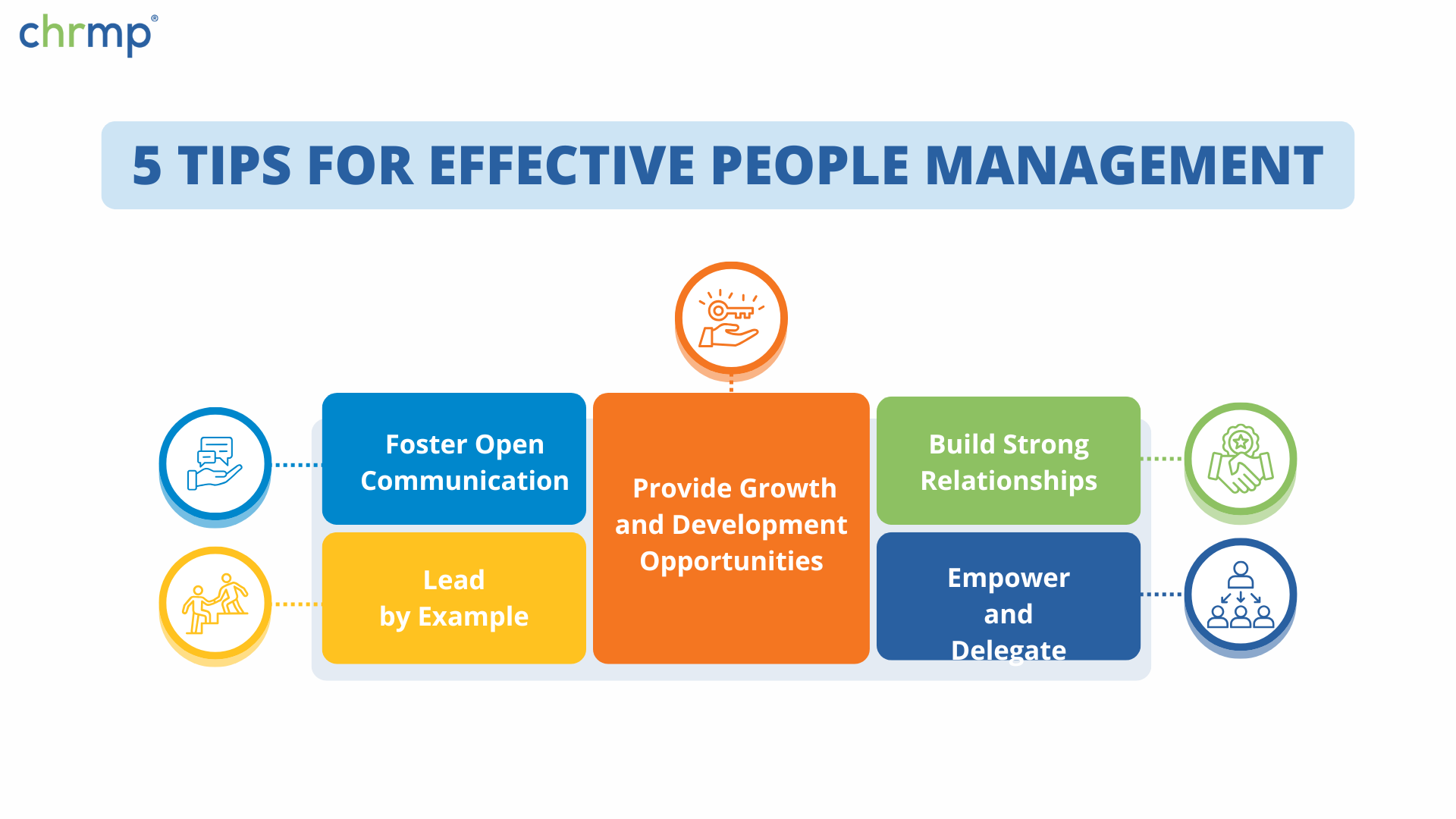

One of the crucial skills for success in today’s fast paced, consumerism driven world is “People Management”. Whether you are the leader of a team or run an organisation, your ability to manage people effectively, can make a huge impact on the success of your initiatives.
People management skills are all about understanding individuals, fostering trust, loyalty towards the organisation, a positive work environment and aligning everyone towards common organisational goals to reap and share the fruits of organisational success.
This blog provides valuable insights into the top fourteen people management skills every leader must have in order to run their team or organisation successfully.
Right from building strong relationships to effectively communicating with people across different tiers of power, we’ll explore key aspects of people management that would enable individuals to excel as a leader.
Let’s get started.
People management, often interchangeably referred to as person management, involves overseeing and guiding employees to achieve organizational goals
It consists of a set of abilities and competencies that are vital for successfully leading and managing individuals in a work environment. Such competencies are vital for creating a positive and productive workplace atmosphere, fostering employee engagement, loyalty and achieving organisational objectives.
At its core, people management aims to maximize employee potential while ensuring their well-being. Effective people management leads to higher employee satisfaction, increased productivity, and reduced turnover.
People management skills help build productive teams, enhance employee engagement, and contribute to key aspects of the company like talent retention, hence they are of importance.
Skilled managers possessing people management skills create a supportive work environment, foster collaboration, and prioritise the growth and development of their team members, leading to higher productivity, job satisfaction and the retention of top talent ,thus contributing significantly to organisational success.
Effective people management enables leaders to understand the strengths and weaknesses of team members, allowing them to assign tasks and delegate responsibilities in a way that maximises productivity and aligns with individual capabilities. It also involves winning over their trust and loyalty and reciprocating the same.
By fostering collaboration and creating a supportive work environment, managers promote open communication, support the growth and development of team members, leading to higher productivity, job satisfaction, and talent retention thus creating cohesive teams that work together towards achieving organisational goals.
Top people management skills that every HR professional should have:

Influence is a vital people management skill that shapes team dynamics and drives organizational success. Managers who effectively wield influence can inspire and motivate their team, guiding them towards shared goals. By maintaining a positive outlook, providing encouragement, and recognizing achievements, they contribute to a motivating work environment. Demonstrating integrity and providing clear direction, influential managers foster a culture of trust and respect. Their ability to communicate a compelling vision and foster a sense of optimism and enthusiasm encourages team members to perform at their best. Through consistent and positive influence, managers not only enhance individual and team productivity but also contribute to the overall growth and success of the organization.
Effective people management skills for managers include strong problem-solving abilities, enabling them to analyze complex situations, identify root causes, and find creative solutions to resolve disputes. A good manager person fosters a problem-solving mindset within their team, dissipating conflicts by actively involving team members in identifying and implementing mutually satisfactory solutions.
Managers who demonstrate accountability, take responsibility for their words, actions and decisions. They hold themselves and their team members accountable for meeting goals and objectives, also admit their mistakes, if need be, and correct them. By setting clear expectations, fostering open communication, tracking progress, and addressing issues that arise, they foster a culture of accountability, trust, loyalty towards the organisation and ensure achievement of results.
Emotional intelligence is a crucial skill in people and management, enabling managers to understand and manage their own emotions and those of their team members. By leveraging emotional intelligence, managers can foster a supportive and empathetic work environment, improve communication, and effectively resolve conflicts. This enhances team cohesion and productivity, leading to a more harmonious and efficient workplace
Empowerment is an essential people management skill that focuses on granting employees the authority and autonomy to make decisions and take initiative. By empowering their team, managers foster a sense of ownership and responsibility, which boosts morale and drives engagement. This approach encourages innovation and creativity, as employees feel more confident to share their ideas and solutions. To effectively empower their team, managers need to provide clear guidance, trust their employees, and offer the necessary resources and support, ensuring everyone feels capable and valued in their roles
Clear and effective communication is vital for conveying expectations, providing feedback, and fostering a collaborative environment. Good managers prioritize open communication channels, ensuring that employees feel heard and valued. Managers who communicate clearly, listen actively, and adapt their communication style to suit different individuals foster open dialogue and understanding. They ensure that information flows smoothly through designated channels and address any disputes or conflicts in a timely and constructive manner.
Recognizing and acknowledging the contributions and achievements of team members is essential for maintaining motivation and morale. Effective people managers celebrate contributions by providing well-deserved credit, demonstrating appreciation, and offering positive reinforcement. This approach promotes a culture of recognition and fosters a sense of collective accomplishment and satisfaction among team members. Celebrating contributions can take various forms, including incentives, awards, promotions, and raises, ensuring that employees feel valued and motivated to continue their exceptional performance
8. Adaptability
The ability to adjust plans, strategies, and approaches to accommodate the evolving needs and challenges of the organization and employees is a crucial trait of adaptable managers. They support their team in fostering resilience and adaptability, which are essential for effective people management. Managers with strong people management skills understand the importance of being flexible in response to changing circumstances, ensuring their team remains motivated and productive despite any challenges. Adaptability is a cornerstone of successful people management skills for managers, enabling them to navigate uncertainties and maintain a positive work environment.
Trust is the foundation of strong relationships and effective teamwork. People managers who build trust inspire confidence and create a positive work environment where team members feel safe to take risks, share ideas, and collaborate. They demonstrate trustworthiness, empower their team, and foster a culture of openness and mutual respect. It takes a little time, repeated reinforcement and appropriate reciprocation to build trust.
Active listening is a critical skill for people managers. By attentively listening to their team members, managers gain valuable insights, comprehend individual needs, and build stronger relationships. They create a safe space for open and honest communication, ensuring that every team member feels heard and understood, simultaneously clearing away misunderstandings if any.
11. Decision Making
Decision-making is a critical component of effective people and management. It requires a blend of experience, knowledge, and critical thinking. Managers with strong man management skills assess situations, weigh options, and make informed choices that benefit both the team and the organization. By providing sound judgment and ensuring that decisions are acceptable to all parties involved, they foster a positive work environment and contribute to long-term organizational success.
12. Delegation
Delegation is a key aspect of leadership and people management. An effective manager person provides direction, inspiration, and guidance by delegating tasks appropriately and empowering their team. By winning over trust and loyalty, they set positive examples for employees to follow, inspire confidence, and create a vision that aligns with organizational goals. Through strategic delegation, they apportion tasks effectively, encourage personal and professional growth, and ensure that team members feel valued and engaged.
Nurturing managers prioritize the well-being and success of their team members. They provide guidance, resources, and mentorship thus ensuring that individuals have the support they need to excel in their roles. These managers foster an environment of care, empathy, collaboration, and encouragement, creating a workplace where team members feel valued and motivated. Through their nurturing approach, they help build a cohesive and high-performing team.
Being approachable is essential for building open lines of communication and creating a supportive work environment. Approachable managers make themselves available, actively listen, and encourage team members to seek guidance or share their concerns without hesitation. They create a safe space where everyone feels comfortable approaching them with any issues or ideas that might need sounding out with the manager.
Understanding and sharing the feelings of others are crucial aspects of effective people management. Empathetic leaders, equipped with strong people handling skills, are better able to manage conflicts, motivate employees, and foster a supportive workplace culture. By cultivating empathy, leaders can build strong relationships and enhance team cohesion, ultimately driving organizational success
While the terms “people manager” and “leader” are often used interchangeably, there are some distinctions between the two:
1. Scope of Influence
A people manager’s influence is typically limited to their immediate team or department. Managing productivity, performance and development of their direct reports, resolving conflicts, and ensuring the team’s success is the people manager’s responsibility. In contrast, a leader’s, scope of influence extends beyond their immediate team. They have a wider organizational impact, influencing the culture, values, and direction of the entire organization. Leaders often interact with stakeholders at various levels and work towards aligning different teams or departments towards a common vision and organisational objective.
2. Approach to Relationships
A more hands-on approach to relationships with their team members is needed by effective people’s managers. They focus on providing guidance, feedback, and support, ensuring that individuals have the resources they need to perform their tasks in their respective roles effectively. Leaders, on the other hand, tend to focus on building relationships across different levels based on trust, influence, and inspiration. They create a shared vision, empower team members, and encourage collaboration and innovation.
3. Time Horizon
People managers often work within shorter timeframes, and are responsible for achieving immediate goals and ensuring that day-to-day operations run smoothly. Their time horizon is typically shorter-term and more operational in nature. Leaders, however, work with a longer time horizon, envisioning and planning for the future of the organization, working at different levels of authority. Anticipation of changes, setting strategic objectives, and driving initiatives that shape the organisation’s long-term success, is their reponsibility.
4. Skills Emphasis
People managers should have strong organizational, communication, and problem-solving skills. They have to excel at managing resources, coordinating tasks, and ensuring that operational objectives are met. Leaders, on the other hand, have to emphasize strategic thinking, vision-setting, influencing, and inspiring others. They should possess the ability to navigate ambiguity, make tough decisions, and communicate a compelling vision to steer the organization towards a shared objective.
There is overlap between the roles of people managers and leaders, but the distinction lies in the scope, focus, relationship dynamics, and skill set required. Effective leadership often encompasses both people management skills and broader leadership qualities, allowing individuals to effectively manage teams while also driving organizational success.


Five tips for effective people management:
1.Foster Open Communication
An environment where open and honest communication is encouraged should be strived for. Team members should be listened to carefully to be able to provide feedback regularly, and be approachable. Two-way dialogue should be encouraged and opportunities for team members to share their ideas, concerns, and suggestions should be created and transparency in communication be promoted.
2. Lead by Example
Lead by example and set high standards for yourself. The behaviour and work ethic one expects from the team members should be displayed by the people manager. Show integrity, accountability, and professionalism in your actions. This sets a positive tone to all interactions and encourages the team to follow suit.
3. Provide Growth and Development Opportunities
Growth and development initiatives for the team members should be encouraged , by providing opportunities for learning and skill enhancement. Training programs, mentorship, and guidance to help individuals reach their full potential should be offered from time to time by the organanization. Capitalize on their strengths, and provide constructive feedback to aid in their professional development. Recognition plays a vital role in boosting team morale.
4. Build Strong Relationships
Investing time and effort in building strong relationships with team members goes a long way. Getting to know them personally, understanding their individual strengths, goals, and challenges is a must for a peoples’ manager. Showing appreciation for their contributions and creating a sense of camaraderie and trust within the team makes for a positive work environment and enhanced teamwork.
5. Empower and Delegate
Trust your team members, demonstrate respect for your team members’ opinions, value their contributions, and actively involve them in decision-making processes ,empower them to make decisions and encourage them to be accountable for it. Delegating tasks and responsibilities appropriately, providing autonomy and support ,encouraging innovation, creativity, and independent thinking boosts team morale and develops the skills and capabilities of the team members.
Effective people management is an ongoing process that requires continuous effort and adaptation. By implementing these tips, you can cultivate a positive and productive work environment, foster employee engagement, retain top talent and achieve optimal results with your team and boost team morale.
FAQ 1: Why are people management skills important in the workplace?
Answer: People management skills are crucial in the workplace because they help build productive teams, enhance employee engagement, and contribute to the overall success of the organization. Effective people management skills foster positive relationships, promote open communication, and support the growth and development of team members, leading to higher productivity, job satisfaction, and talent retention.
FAQ 2: How can I improve my communication skills as a people manager?
Answer: Improving communication skills as a people manager involves active listening, clarity in conveying messages, and adapting communication styles to suit different individuals and situations. It also includes providing timely and constructive feedback, fostering open dialogue, and promoting transparency in communication. Practicing effective communication techniques and seeking feedback from team members can greatly enhance communication skills.
FAQ 3: How do I handle conflicts within my team?
Answer: Handling conflicts within a team requires a proactive approach. It’s essential to address conflicts promptly and constructively. Start by understanding the perspectives of the involved parties, actively listen to their concerns, and encourage open dialogue. Seek mutually beneficial solutions and facilitate a resolution process that promotes understanding and collaboration. If necessary, consider involving a neutral third party or mediator.
FAQ 4: What is the role of a people manager in employee development?
Answer: A key role of a people manager is to support the development of their team members. This involves identifying individual strengths, interests, and areas for growth. People managers should provide guidance, offer opportunities for learning and skill enhancement, and encourage employees to set and achieve professional goals. Regular feedback and coaching sessions can help individuals develop their skills and reach their full potential.
FAQ 5: How can I build trust and rapport with my team as a people manager?
Answer: Consistent actions and behaviours is needed to build trust and rapport. Keep your promises and show authenticity, be transparent, demonstrate respect for your team members’ opinions, value their contributions, and actively involve them in decision-making processes. Act as a supportive mentor, listen to their concerns, and provide a safe space for open communication. Building trust takes time, but by consistently demonstrating trustworthiness, you can foster strong relationships with your team members.
The cornerstone of successful leadership and organisational growth is effective people management. By mastering the art of leading, motivating, and supporting individuals, managers can create a positive work environment where teams can thrive and achieve their full potential.
Through this blog, we have tried to explore various key aspects of people management, from fostering open, transparent communication and building strong relationships to promoting accountability and providing growth opportunities to employees. We have emphasized the importance of effective leadership, active listening, and conflict resolution in driving the team to success.
Effective people management is an ongoing journey that requires continuous learning and adaptation. By honing people management skills, you can cultivate a workplace culture that inspires collaboration, innovation, creativity, employee engagement and talent retention.

© 2007-2025 CHRMP| All Rights Reserved | Powered by Ripples Learning & Research Private Limited
